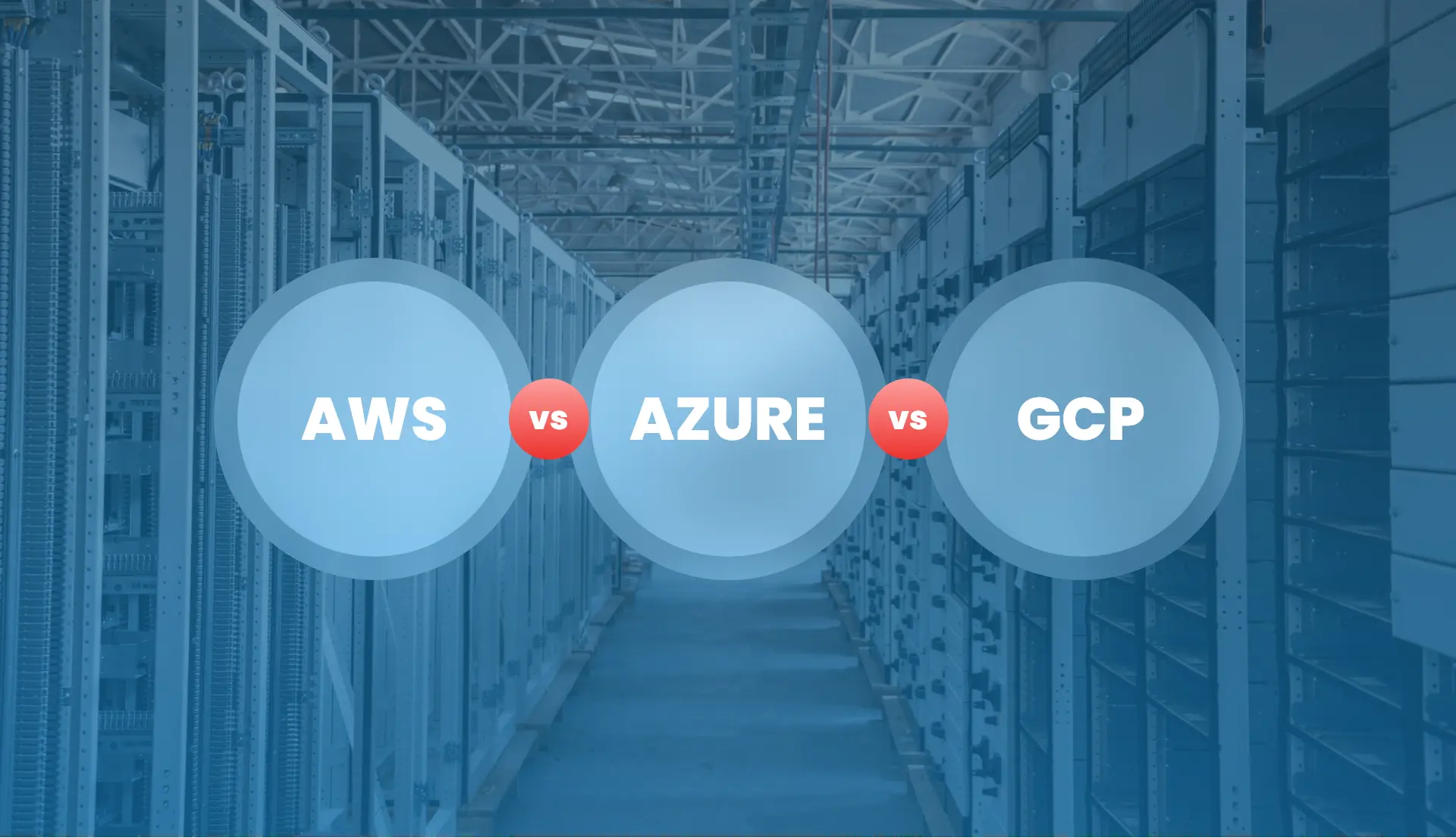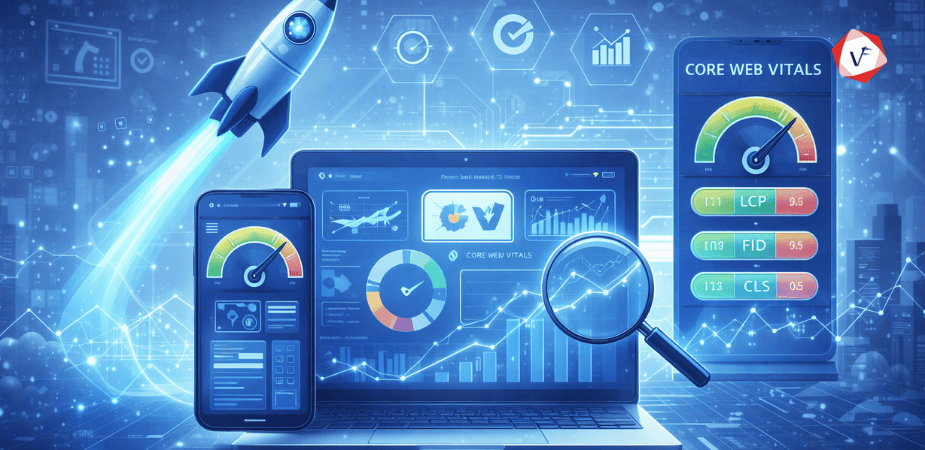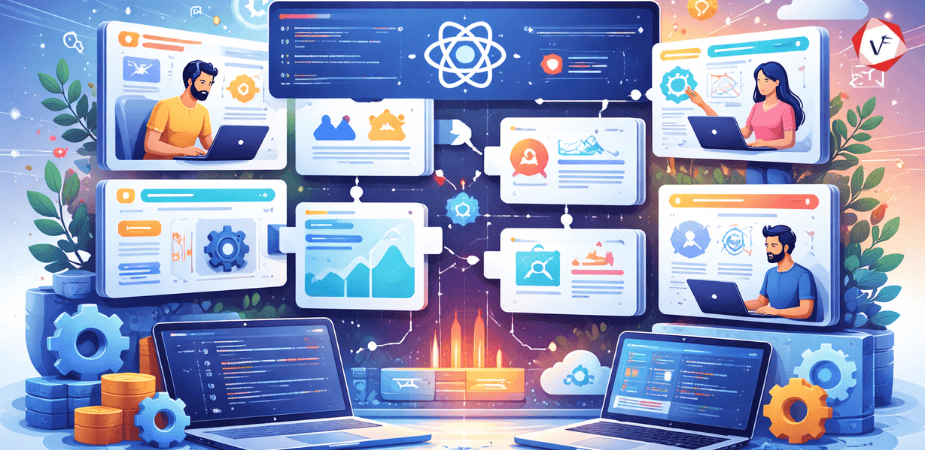- April 24, 2022 6:00 am
- by Manek
- April 24, 2022 6:00 am
- by Manek

Cloud technology has been closing the gap between big businesses and the everyday user when it comes to their hardware/software needs. It has also helped big businesses adopt a more lean format when it comes to their hardware while empowering developers with servers at the click of a button.
Amazon, Microsoft, and Google are considered the safest, most flexible, and most reliable cloud services. This blog focuses on the three major Cloud Service Providers (CSPs), namely AWS, Azure, and GCP. If you are thinking about which platform to choose: AWS vs Azure vs Google Cloud, this article explains all you need to know.
While AWS rightfully takes the top spot on the CSP food chain, Azure is definitely not far behind, with GCP catching up to the two. Seeing that all three platforms are constantly expanding in order to attract more customers, it only makes sense to compare them to find the best fit for your specific needs.
AWS has been around since 2006 and is by far the most mature, secure, and reliable Cloud platform among the three. It also offers the highest number of services (around 200+). These services fall under many categories, such as compute services like ES2 (Elastic Compute 2), storage services like S3 (Simple Storage Service), and database services like Aurora.
Other services are also provided, like those dealing with AI/ML, backups, serverless computing, networking, DevOps, IoT, AR & VR, etc. Seasoned users find AWS to be perfectly suited to their needs. However, the large catalog of services can overwhelm a first-time user.
In terms of price, the smallest instance (with 2 vCPUs and 8 GB RAM) costs around 69 USD/month while the largest instance (which includes 3.84 TB RAM and 128 vCPUs) costs around 3.97 USD/hour.
Know in detail, why enterprises choose AWS services
Azure is the second-largest cloud platform on the market. Thanks to its easy integration of Microsoft apps onto the Cloud, it is the go-to option for about 95% of Fortune-500 companies. This does not mean that Azure is only limited to Windows software/apps, either: it also supports open-source technologies, allowing anyone to build and support any application.
Microsoft Azure has a very impressive set of AI/ML and analytics services, called the Azure Machine Learning Service and Azure Power BI, respectively. Azure’s service catalog is smaller than AWS’s, and it appears to be tailored more for enterprise clients rather than single users.
In terms of price, the smallest instance (with 2 virtual CPUs and 8 GB RAM) costs around 70 USD/month (similar to AWS) while the largest instance (that includes 3.89 TB RAM and 128 vCPUs) costs around 6.79 USD/hour.
Google Cloud Platform only offers around half as many services as Azure and AWS. However, it shines best when used for its services dealing with Big Data, Google Workspace, enterprise Android, and Chrome OS. This makes GCP the go-to option for app development.
Both GCP and Azure have been around since 2010 and show no signs of stopping their expansion. On the other hand, GCP isn’t particularly favorable to enterprise-level clientele.
In terms of price, the smallest instance (with 2 vCPUs and 8 GB RAM) costs around 52 USD/month, while the largest instance (that includes 3.75 TB RAM and 160 vCPUs) costs around 5.32 USD/hour.
Though this makes GCP the cheapest of all the three cloud platform services, whether or not it is cost-effective will depend on your specific needs.
| SERVICE | AWS | AZURE | GCP |
|---|---|---|---|
| VM (Compute Instance) | EC2 (Elastic Compute) | Azure Virtual Machine | Google Compute Engine |
| PaaS | AWS Elastic Beanstalk | App Service | Google App Engine |
| Container | AWS Elastic Container/Kubernetes Service | Azure Kubernetes Service (AKS) | Google Kubernetes Engine |
| Serverless Functions | AWS Lambda | Azure Function | Google Cloud Functions |
| SERVICE | AWS | AZURE | GCP |
|---|---|---|---|
| RDBMS (Multiple Database Types – SQL, MySQL, etc..) | AWS RDS | Azure SQL/ Database for MySQL/PostgreSQL | Cloud SQL |
| NoSQL | DynamoDB, Simple DB | Azure Cosmos DB, Table Storage | BigTable, Cloud Datastore |
| Object Storage | S3 (Simple Storage Service) | Blob Storage | Google Cloud Storage |
| File Storage | Elastic File System | Azure File Storage | Google Filestore |
| Archive Storage | Amazon Glacier | Azure Archive Storage | Google Storage (Archive Storage) |
| Data Warehouse/Data Lake | Amazon Redshift | Azure Synapse Analytics | Google BigQuery |
| SERVICE | AWS | AZURE | GCP |
|---|---|---|---|
| Virtual Network | Virtual Private Cloud (VPC) | Virtual Network (Vnet) | Virtual Private Cloud (VPC) |
| Load Balancing | Elastic Load Balancer | Azure Load Balancer | Google Cloud Load Balancing |
| Firewall | AWS Firewall / Web Application Firewall | Azure Firewall | Google Cloud firewalls |
| DNS | Route 53 | Azure DNS | Google Cloud |
| DNS | |||
| CDN | Amazon CloudFront | Azure Content Delivery Network (CDN) | Cloud CDN |
| SERVICE | AWS | AZURE | GCP |
|---|---|---|---|
| DevOps | CodePipeline, CodeBuild, CodeDeploy, CodeStar | Azure Boards, Pipelines, Repos, Test Plans, Artifacts | GCP DevOps, CloudBuild, Artifact Registry |
| AI & ML | Amazon SageMaker, Amazon Comprehend, Amazon Lex, Amazon Polly | Azure Machine Learning, Azure Databricks, Azure Cognitive Search, Azure Bot Service, Cognitive Services | Vertex AI, AutoML, Dataflow CX, Cloud Vision, Virtual Agents |
| IoT | FreeRTOS, IoT Core, Greengrass, IoT Analytics, SiteWise | Azure IoT Hub/Central, IoT Edge, Azure Sphere, Azure RTOS | Google Cloud IoT Core |
| AR & VR | Amazon Sumerian | Azure Mixed Reality (Spatial Anchors/Remote Rendering) | ARCore |
| Business Analytics | Amazon Quicksight | Azure Power BI | Looker |
AWS
| PROS | CONS |
|---|---|
|
|
AZURE
| PROS | CONS |
|---|---|
|
|
GCP
| PROS | CONS |
|---|---|
|
|
A customer’s requirements, usage, and service requirements generally decide the prices charged for making use of Cloud services. Hence, depending on your specific needs (whether as an individual or a corporate entity), either of the three will be more attractive for use than the other.
It is observed that software vendors typically use AWS in order to offer their products to clients through the Cloud, while most companies that are reliant on Microsoft products use Azure for easy migration of their Microsoft files to the platform. GCP is more of a favorite among those who are focused on Google apps and services, such as app developers.
Another aspect to consider is whether the Cloud provider you’re going for is available in your region and whether it complies with all applicable government regulations regarding Cloud servers in your area.
Microsoft’s Azure has the most coverage, while GCP has the least. Judging from ongoing leaps in the field, however, it seems all the three providers are constantly expanding both their services and coverage well into the future. As an alternative, one can always adopt a multi-cloud plan that makes the most of all three platforms in a single structure.
The above comparison between AWS, Azure and GCP in terms of features, price, services, storage, and type will assist you in your decision making. Reach out to Vofox Solutions,one of the best AWS company in India,to consult our cloud expertise, and walk away with a cloud suit that is tailored just for you.
Guaranteed Response within One Business Day!
What is Infrastructure as Code (IaC)?

Front-End Performance in 2026: What Core Web Vitals Actually Mean for Your Site

What is FinOps?

Micro-Frontends: Breaking Down Monolithic React Applications
.png)
Zero-Trust Security Models for SaaS: What You Need to Know